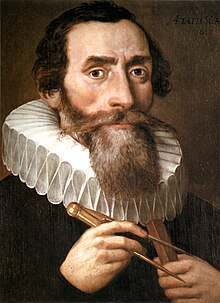From Wikipedia, the free encyclopedia
Johannes Kepler (27 December, 1571 – 15 November, 1630), a kenspeckle chiel in the scientific revolution, wis a German astronomer, mathematician an astrologer. He is best kent for his laws o planetary motion, pit furth in the twa beuks Astronomia nova an Harmonices Mundi.
Johannes Kepler | |
|---|---|
 Portrait of Kepler by an unknown artist, 1610 | |
| Born | December 27, 1571 Free Imperial Ceety o Weil der Stadt, Haly Roman Empire |
| Dee'd | 15 November 1630 (aged 58) Free Imperial Ceety o Regensburg, Haly Roman Empire |
| Residence | Württemberg; Styrie; Bohemie; Upper Austrick |
| Naitionality | German |
| Alma mater | Tübinger Stift, Varsity o Tübingen |
| Kent for | Kepler's laws o planetar motion Kepler conjectur Rudolphine Tables |
| Scientific career | |
| Fields | Astronomy, astrology, mathematics an naitural filosofie |
| Doctoral advisor | Michael Maestlin |
| Influences | Nicolaus Copernicus Tycho Brahe |
| Influenced | Sir Isaac Newton |
| Signatur | |
Kepler wis a professor o mathematics at the Varsity o Graz, court mathemateician ti Emperor Rudolf II, an coort astrologer ti General Wallenstein. Aerlie in his career, Kepler wis an asseistant ti Tycho Brahe. Kepler's career wis at the same time as Galileo Galilei's ane, an thay correspondit.[1]
He is whiles cried "the faremaist theoretical astropheesicist", atho Carl Sagan cried him the hindmaist scienteific astrologer forbye.
Seamless Wikipedia browsing. On steroids.
Every time you click a link to Wikipedia, Wiktionary or Wikiquote in your browser's search results, it will show the modern Wikiwand interface.
Wikiwand extension is a five stars, simple, with minimum permission required to keep your browsing private, safe and transparent.